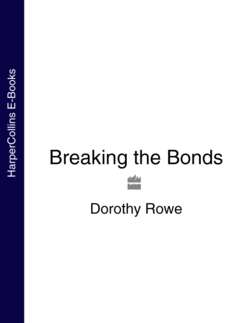Читать книгу Breaking the Bonds - Paula Nicolson, Dorothy Rowe, Dorothy Rowe - Страница 18
Becoming an Expert in Feeling Guilty
ОглавлениеBelieving that you are bad makes you an expert in feeling guilty. There is no situation about which you cannot feel guilty once you put your mind to it. The starving children of Africa? ‘I ought to do something about them and I haven’t.’ The hole in the ozone layer? ‘I’ve used aerosols and I drive a car, so it’s my fault.’
Closer to home you as the expert in guilt feel responsible for ensuring the total happiness of all of your family, or for the total success of the organization for which you work. Thus, when your adult child has an unhappy love affair, or your cousin twice removed fails to send you a Christmas card, you feel guilty. Or when your organization does not reach the over-optimistic targets the directors set, or your colleague has a drink problem, you feel guilty.
As an expert in guilt you cannot live in the present. You are constantly worrying about the past and fearing the future. As an expert in guilt you cannot enjoy happiness when it comes, for you believe that as night follows day, suffering will follow joy. When good fortune does come your way, you know it will not stay, for you are the guilty one and you will be punished.
Why do we go on feeling guilty? Why do we inflict such pain upon ourselves?
Because by feeling guilty we are declaring that we are not helpless.
By feeling guilty we are declaring, ‘In the past I could have acted differently. I had the power to act one way or another, and I chose the wrong way.’
By feeling guilty we are declaring that we had the situation organized and under control, or could have done, and that we had the power to relate to and care for other people.
Feeling guilty is a denial of helplessness.
Feeling helpless can take you back to the time when you were weak and helpless and in the power of dangerous adults. Rather than experience again that most terrible terror, you prefer to feel guilty.
Alas, because you will not risk the terror to reappraise your conclusion that you are bad, you prevent yourself from discovering that your situation has changed. Your situation now, as an adult, is that your self is secure and cannot be threatened by other people unless you let them.
If you insist on saying to yourself, ‘I’d be finished if my husband left me’, you have given your husband the power to threaten your self. If you insist on saying to yourself, ‘I just fall apart whenever my boss criticizes my work’, you have given your boss the power to threaten your self.
However, if you say to yourself, ‘It would be tough going if my husband left me but I’d survive’, your husband cannot then threaten your self. If you say to yourself, ‘I’ll take account of reasonable and constructive criticism of my work, but I’ll reject criticism from people who are fools or are being malicious, and I’ll remember to distinguish criticisms of my work from criticisms of me’, then you are no longer helpless and in the power of other people.
If we do not go back and check our conclusion that ‘I am bad’ we make this and the constant feeling of guilt into our way of living. It becomes the basis of our whole way of living, and it spoils not just our life but the lives of those we love.
My friend Gregory, who lives in California, and I keep a regular correspondence. Recently he wrote to me:
‘I have come to realize how much I played the role of The Guilty One from childhood on.
‘As is typical of introverted children of alcoholic parents, my unconscious feeling as a child was that if only I were a better boy my father would stop being drunk and abusive and my parents would love each other. As none of that happened, it was clear that I was not a good enough boy and that I must work harder. And as working harder didn’t make things any better, then I must be a Failure: I was The Guilty One responsible for my family’s misery.
‘I transferred this neurosis right over into my marriage, and it fitted Anna’s beautifully. Deeply unhappy since childhood, Anna quickly found (unconsciously, not deliberately) that I was willing and able (and probably sickly eager) to be The Guilty One responsible for her unhappiness. And this, of course, made me very angry. What can make us angrier than situations that we put ourselves into?
‘My shrink thinks, rightly I’m sure, that my ‘moderately severe’ depression was my latest effort to punish myself (and a very successful effort it was too).
‘I am simply refusing to play this game any more. It means changing a behaviour I have had since I was five, and of course it isn’t easy, but I’m doing fairly well, I think.’
When Gregory claimed that he ‘was The Guilty One responsible for my family’s misery’, he was making a claim to great power. His parents were not responsible for themselves. He, a small child, was.
Feeling guilty with its claim to great power is one of the compensations for drawing the conclusion ‘I am bad’. There are others.
